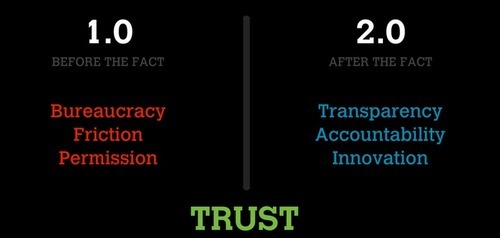Should we regulate the Internet like the real world or the real world like the Internet?
Data & Society / saved 2014-02-13
Summary:
That’s a long title. And to be grammatically correct, it should really say “Should we regulate the Internet like we do the real world or the real world like we do the Internet?” but that felt _really_ long. Anyway, I digress.
Tomorrow, the taxi committee of Seattle’s City Council is voting on proposed new regulations for ridesharing services. You can read the full proposal here, and Todd Bishop from GeekWire has a good summary here (updated here).
The gist of the proposed regulations is to treat rideshare vehicles (such as those dispatched by Sidecar, Lyft in the US, and Carpooling.com and BlaBlaCar in Europe) like taxis — imposing a traditional regime of licensing, inspection, limitations and disclosure. Here are some highlights:
- Classify ”Transportation Network Company” (TNC) vehicles as “for-hire” vehicles (i.e., taxis or liveries)
- Limit total number of TNC cars to 300 citywide (across all platforms)
- Limit driving hours per-car to 16hrs per week
- Drivers must apply for a special permit and pass a special test (in person)
- Drivers must take a defensive driving course and pass a test
- Vehicle inspections at state-approved facilities
- Criminal background checks for drivers
- Drivers can only affiliate with a single TNC (e.g., I can only drive for Lyft or Sidecar, not both)
- Require the TNC company (platform) to physically locate in Seattle
- Insurance requirements
As for the stated goals of the regulations, there are several, but really the main ones are:
- "The Council finds that as the use of application dispatch technology by unlicensed companies, vehicles, and drivers raises significant public safety and consumer protection concerns; and
- The Council finds that the use of application dispatch technology by unlicensed companies and drivers are competing with existing licensed taxicab and for-hire drivers in the transportation market and causing negative impacts;”
In other words: ensure public safety, and protect the existing taxi industry.
Leaving aside the second one, and whether that should be a priority, I just want to focus on how we might go about ensuring safety and building trust. Long time readers will recognize this graphic:

The proposed Seattle regulations are a perfect example of a “1.0” trust regime. Build a high bar for participation, where new actors (TNC companies, drivers) must prove a lot up front and ask permission to operate. This is how we’ve regulated the real world in the industrial era.
This is NOT how things are typically regulated in the internet era. In fact, it’s essentially the opposite. ”2.0” regulatory schemes let anyone get started, and over time they are judged by their actions, driven by peer review and public data. Think Ebay, Airbnb, Uber, even Craigslist, and every other site that has user-generated content and peer-to-peer transactions.
I like to use the example of “what if Ebay had done up-front, centralized vetting of every seller on the platform?” That simply wouldn’t have been possible at web scale, in an environment where many many many smaller actors are entering the market at high speed. Instead, the answer was to create trust, safety and fairness (e.g., “regulate”) in a way that is massively scalable and also allows even the smallest actors to participate with minimal initial overhead.
So it’s entirely unfair to criticize these new businesses as “unregulated” (as they are criticized in the Seattle draft regs). That completely misses the fact that there is actually VERY INTENSE accountability in most of these systems. Uber drivers get kicked off the platform (for better or worse) if their ratings drop below 4.3. They may not be “licensed” the same way as traditional cars, but they sure are held accountable for their actions, which absolutely does incentivize good service.
So, as more and more real-world regulatory regimes bump into internet-based businesses (ridesharing and homesharing have been the two big ones recently but it’s happening in every sector), the question keeps coming up: should we regulate this the real-word / industrial / 1.0 way, or the internet way?
And the most common answer, so far, is to apply 1.0, industrial-style, regula
Link:
http://nickgrossman.is/post/76566568384Updated:
02/13/2014, 17:23From feeds:
Fair Use Tracker » Current Berkman People and ProjectsData & Society » Data & Society / saved